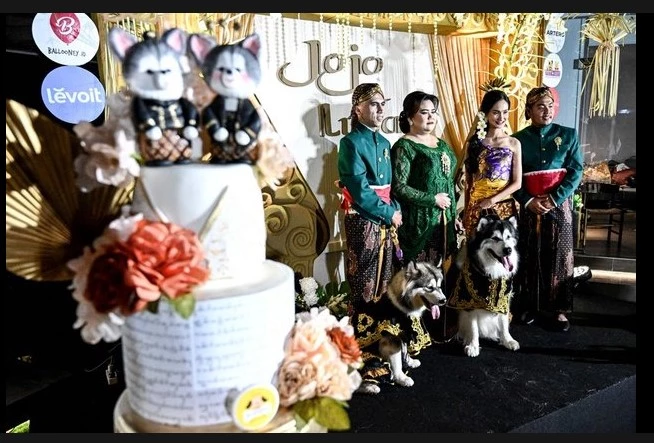Indonesians sorry after lavish dog 'wedding' backlash

Stay tuned with 24 News HD Android App

Two Indonesian women have apologised after a lavish "wedding" for their dogs sparked a backlash in the middle-income country, where wealth distribution is one of the most unequal in the world.
Two Alaskan Malamutes were wedded Friday at a mall in the capital Jakarta, donning traditional Javanese costumes alongside their owners and relatives at a fake ceremony that reportedly cost 200 million rupiah ($13,350).
A social media uproar followed after images emerged of the wolf-like dogs taking each other's paws in marriage at the extravagant ceremony, forcing the owners into a contrite news conference.
"We regret it very much and we would like to apologise for the Javanese culture enthusiasts and all Indonesians who were uncomfortable and hurt by the event," Indira Ratnasari, owner of female dog Luna, said Wednesday.
"We had no intention to insult the Indonesian and the Javanese culture," she said, according to footage posted on her makeup artist's Instagram account.
Ostentatious displays of wealth in the world's fourth-most populous country are frowned upon and often criticised because of its widening income gap.
The minimum monthly wage in Jakarta is 4.9 million rupiah ($327) and the World Bank last year said nearly a tenth of Indonesia's 270 million people still live below the poverty line.
Ratnasari is on the payroll of the Indonesian presidential office, local media reported.
Indonesian President Joko Widodo told public officials in a March speech not to flaunt their extravagant lives in "improper" ways, including social media posts.
Valentine Cahandra, owner of male dog Jojo, claimed the wedding took place to promote Javanese culture.
But angry Indonesians took to social media to condemn the expensive canine nuptials.
"It's wasting money and defying God. Common sense has gone, trampled by the desire to show off," one Twitter user posted.
Another wrote: "Unnecessarily wasting their wealth, they should have helped people in need instead."
"Is this what we call 'social blindness'?"
